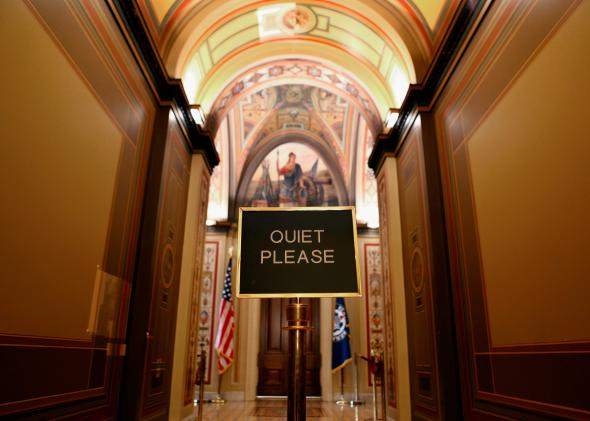The Senate’s Roll Call Vote on Syria, Explained

Photo by Chip Somodevilla/Getty Images
Yesterday, as the Senate was smelling jet fuel* and voting on the continuing resolution that would fund the government and throw some coin to rebels in Syria, I was at the Liberty Political Action Conference down the highway from D.C. The annual event gathers together the more directly political, election-centric elements of the Liberty Movement—Ron Paul's faction—and offers up some networking, speeches, and training. First Sen. Rand Paul trashed the CR, then Michigan Rep. Justin Amash joined the pummeling.
"You saw they stuck arming the Syrian rebels in a bill to fund the government?" Amash asked the crowd. "About a year and a half ago, they were complaining about the fact we didn’t have a 'clean CR.' This year they want to throw things into it!"
So why wasn't there more resistance? Because the numbers were not there. The thinking in Rand Paul's camp was that a filibuster could only delay the vote by a day. Better to make an impassioned speech, work the crowds at a friendly conference, then head to California for some GOP events that had long been scheduled. The roll call confirms the wisdom of Paul's plan—only 12 Republicans and 10 Democrats voted "no."
Who were they? On the Republican side, Paul was joined by Utah Sen. Mike Lee and Texas Sen. Ted Cruz, the "three amigos" who regularly cast libertarian votes. Kansas Sen. Pat Roberts, who is fighting a surprise challenge from an independent candidate, voted no; his colleague and NRSC chairman, Sen. Jerry Moran, stuck with him. Both Idaho senators and both Wyoming senators voted no, as they are perhaps the least vulnerable members of the upper house in America. Alabama Sen. Jeff Sessions voted no after his amendment to end the DACA program was tabled; Oklahoma Sen. Tom Coburn, retiring at the end of the year, joined him. (Nevada Sen. Dean Heller was also a "no," citing "too many uncertainties.")
On the Democratic side, it may irritate Secretary of State John Kerry that both of his state's senators voted "no." Sen. Ed Markey, who holds the old Kerry seat, faces an easy re-election in six weeks. Sen. Elizabeth Warren's vote was more notable (even if, as I think, the 65-year-old freshman senator never runs for another office) because her progressive fans had been waiting for her to stake out any kind of foreign policy position. They were upset when she repeated the standard administration line on Israel's Gaza war this year. They are calmed, a bit. Warren was joined by senators from blue states, including New York Sen. Kirsten Gillibrand, who at 47 is considered a possible national candidate someday.
But the only Democrat facing a tough race who voted "no" was Alaska Sen. Mark Begich. His opponent, Bush administration veteran Dan Sullivan, said he would have supported the vote. Every other Democrat facing re-election in a swing state this year voted "yes."
*A Capitol Hill expression, which is less well-known than I sometimes think, meaning they want to jump on the planes and go home already.
